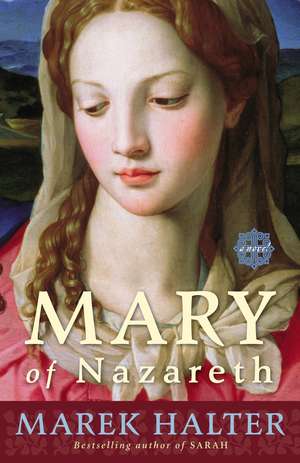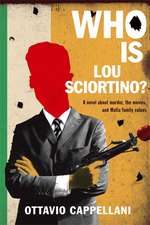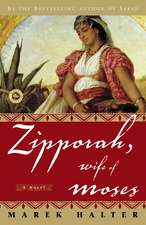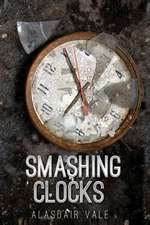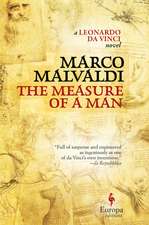Mary of Nazareth
Autor Marek Halter Traducere de Howard Curtisen Limba Engleză Paperback – 30 noi 2008
Mary was born into a Palestine oppressed by Herod the Great; she is accustomed to living with uncertainty and unrest. But when her beloved father is wrongly imprisoned by the Romans, she takes action. She calls upon a well-known rebel by the name of Barabbas, and together they set out to save her father. A daring escape is planned. And against staggering odds, Mary’s father is saved from crucifixion.
Barabbas—flush with his success—is intent on leading a full-scale rebellion against Herod and the Romans. But as he speaks before Jewish leaders, Mary feels great frustration as the men endlessly debate morality, rebellion, and God's will. She has almost lost her father, but she is nevertheless compelled to speak out against violence.
To her surprise, one man listens: Joseph. He makes Mary an offer that will change her life—and the history of the Jewish people—forever.
Preț: 106.45 lei
Nou
Puncte Express: 160
Preț estimativ în valută:
20.37€ • 21.19$ • 16.82£
20.37€ • 21.19$ • 16.82£
Carte disponibilă
Livrare economică 24 martie-07 aprilie
Preluare comenzi: 021 569.72.76
Specificații
ISBN-13: 9780307394842
ISBN-10: 0307394840
Pagini: 309
Dimensiuni: 130 x 198 x 20 mm
Greutate: 0.23 kg
Editura: Three Rivers Press (CA)
ISBN-10: 0307394840
Pagini: 309
Dimensiuni: 130 x 198 x 20 mm
Greutate: 0.23 kg
Editura: Three Rivers Press (CA)
Recenzii
"[In Mary of Nazareth] Halter has created a memorable and appealing heroine."
—Historical Novels Review
"A worthy heiress to Anita Diamant’s bestseller The Red Tent, [Sarah is] an entertaining read, with a heroine who uses both her brain and her femininity to astonishing effect."
—Atlanta Journal-Constitution
“A brilliant achievement: packed with drama and suspense, powerfully engaging and thought-provoking. This is Halter at his best–by offering his own intriguing interpretation of Mary’s life, he builds bridges across the millennia and across different faiths and cultures.”
—Eva Etzioni-Halevy, author of The Song of Hannah and The Garden of Ruth
“How much can a mother influence the path that her child chooses? Halter provides a dazzling new look at the most famous mother of them all–in the important years before motherhood. In the midst of the political turmoil of first-century Palestine, Mary shines forth as an advocate for liberation through peaceful means. Like the great biblical heroines before her, she is a woman of faith, courage, and action. Mary of Nazareth will inspire women of all faiths who yearn for peace and freedom.”
—Rebecca Kohn, author of The Gilded Chamber: A Novel of Queen Esther
“By giving a voice to Mary of Nazareth, Merek Halter resurrects one of the most fascinating women in history. A story as richly imagined as it is illuminating.”
—Michelle Moran, national bestselling author of Nefertiti
From the Hardcover edition.
—Historical Novels Review
"A worthy heiress to Anita Diamant’s bestseller The Red Tent, [Sarah is] an entertaining read, with a heroine who uses both her brain and her femininity to astonishing effect."
—Atlanta Journal-Constitution
“A brilliant achievement: packed with drama and suspense, powerfully engaging and thought-provoking. This is Halter at his best–by offering his own intriguing interpretation of Mary’s life, he builds bridges across the millennia and across different faiths and cultures.”
—Eva Etzioni-Halevy, author of The Song of Hannah and The Garden of Ruth
“How much can a mother influence the path that her child chooses? Halter provides a dazzling new look at the most famous mother of them all–in the important years before motherhood. In the midst of the political turmoil of first-century Palestine, Mary shines forth as an advocate for liberation through peaceful means. Like the great biblical heroines before her, she is a woman of faith, courage, and action. Mary of Nazareth will inspire women of all faiths who yearn for peace and freedom.”
—Rebecca Kohn, author of The Gilded Chamber: A Novel of Queen Esther
“By giving a voice to Mary of Nazareth, Merek Halter resurrects one of the most fascinating women in history. A story as richly imagined as it is illuminating.”
—Michelle Moran, national bestselling author of Nefertiti
From the Hardcover edition.
Notă biografică
MAREK HALTER was born in Poland in 1936. During World War II, his family escaped the Warsaw ghetto and settled in France. He is the author of several critically acclaimed, internationally bestselling novels, including the Canaan Trilogy: Sarah; Zipporah, Wife of Moses; and Lilah.
From the Hardcover edition.
From the Hardcover edition.
Extras
The torpor of early morning was shattered by the cries of children.
“They’re here! They’re here!”
In his workshop, Joachim was already at work. He exchanged glances with his assistant, Lysanias, but did not let himself be distracted by the noise. In a single movement, they lifted the cedar beam and placed it on the workbench.
Groaning, Lysanias massaged his lower back. He was too old for this heavy work, so old that no one, not even he himself, could remember when exactly he had been born, in a village somewhere far away in Samaria. But Joachim had been working with him forever, and could not imagine replacing him with a young apprentice. It was Lysanias, as much as his own father, who had taught him the trade of carpentry. Together, they had made more than a hundred roofs in the villages around Nazareth. Several times, their skills had been demanded from as far away as Sepphoris.
They heard footsteps in the courtyard as the cries of the children still echoed around the walls of the village. Hannah stopped in the doorway of the workshop. The morning sun cast her shadow across the Xoor as far as their feet.
“They’ve arrived,” she said.
The words were unnecessary, she knew. But she had to say them, to give an outlet to her fear and anger.
Joachim sighed. “I heard.”
There was no need to say more. Everyone in the village knew what was happening: The tax collectors of the Sanhedrin had entered Nazareth.
For days now, they had been going from village to village in Galilee, and the news of their coming had preceded them like the rumor of a plague. Each time they left a village, the rumor grew. It was as if they were devouring everything in their path, like the locusts inXicted on Pharaoh’s Egypt by the wrath of Yahweh.
Old Lysanias sat down on a wooden block and shook his head. “We should stop yielding to those vultures! We must let God decide who to punish: them or us.”
Joachim ran his hand over his chin and scratched his short beard. The previous evening, the men of the village had gathered to give vent to their fury. Like Lysanias, several of them had decided they would give nothing more to the tax collectors. No grain, no money, no objects. Let each person step forward empty-handed and say, “Go away!” But Joachim knew these were just words, the hopeless dreams of angry men. The dreams would fade, and so would their courage, as soon as they had to face reality.
The tax collectors never came to plunder the villages without the help of Herod’s mercenaries. You might be able to present yourself to the tax collectors empty-handed, but anger could do nothing against spears and swords. It would simply provoke a massacre. Or drive home your own powerlessness and humiliation.
The neighborhood children stopped outside the workshop and surrounded Hannah, their eyes bright with excitement.
“They’re in old Houlda’s house!” they cried.
Lysanias stood up, his lips trembling. “What can they possibly hope to Wnd at Houlda’s? She doesn’t have anything!”
Everyone in Nazareth knew how close Houlda and Lysanias were. If it had not been for tradition, which forbade Samaritan men to marry Galilean women, or even to live under the same roof, they would have become husband and wife a long time ago.
Joachim stood up and carefully tucked the ends of his tunic into his belt. “I’ll go,” he said to Lysanias. “You stay here with Hannah.”
Hannah and the children stood aside to let him pass. No sooner was he outside than he was startled to hear Miriam’s clear voice. “I’ll go with you, Father.”
Hannah immediately protested. This was no place for a young girl. Joachim was about to agree with her, but Miriam’s determined expression dissuaded him. His daughter was not like other girls. There was something stronger, more mature about her. Braver and more rebellious, too.
The fact was, her presence always made him happy: a fact so obvious that Hannah never failed to make fun of him for it. Was he one of those fathers besotted with their daughters? Perhaps. If so, where was the harm in it?
He smiled at Miriam and gestured to her to walk beside him.
Houlda’s house was one of the Wrst you came to as you entered Nazareth from the direction of Sepphoris. By the time Miriam and Joachim arrived, half the men in the village had gathered outside it.
About twenty mercenaries in leather tunics stood a little way along the road, guarding the tax collectors’ horses and the mule-drawn carts. Joachim counted four carts. These vultures from the Sanhedrin were aiming high if they hoped to Wll them.
Another group of mercenaries, under a Roman oYcer, were lined up in front of old Houlda’s house, holding spears and swords, all with an air of indiVerence.
Joachim and Miriam did not see the tax collectors immediately. They were inside the tiny house.
Suddenly, they heard Houlda’s voice. A hoarse cry that split the air. There was a scramble in the doorway, and out they came.
There were three of them. They had hard mouths and the kind of arrogant expression in their eyes that power confers on people. Their black tunics swept the ground. The linen veils covering their skull caps were black too, and concealed most of their faces apart from their dark beards.
Joachim clenched his jaws until they hurt. Just seeing these people made him seethe with anger. With shame, too, and the desire to kill. May God forgive them all! They were vultures indeed, just like those that fed on the dead.
Guessing his thoughts, Miriam took him by the wrist and squeezed it. All her tenderness was in that gesture, but she shared too much of the father’s pain to really calm him.
Again, Houlda cried out. She begged, thrusting forward her hands with their gnarled Wngers. Her bun came loose, and locks of white hair fell across her face. She tried to catch hold of the tunic of one of the tax collectors, stammering, “You can’t do it! You can’t!”
The man broke free, and pushed her away with a grimace of disgust. The two others came to his aid. They seized old Houlda by the shoulders, making no allowances for her age and frailty.
Neither Miriam nor Joachim had yet discovered why Houlda had cried out. Then one of the tax collectors moved forward and they saw, between the tails of his black tunic, that he was holding a candlestick against his chest.
It was a bronze candlestick, older than Houlda herself, decorated with almond Xowers. It had come down to her from her distant ancestors. A Hanukkah candlestick, so old that, according to her, it had belonged to the sons of Judas Maccabaeus, the Wrst people to light candles in celebration of the miracle of eternal light. It was certainly the only thing of any value that she still possessed. Everyone in the village knew the sacriWces Houlda had had to make in order not to part with it. More than once, she had preferred to go without essentials rather than sell it for a few gold coins.
At the sight of this candlestick in the tax collector’s possession, the villagers cried out in protest. In the households of Galilee and Israel, wasn’t the Hanukkah candlestick as sacred as the thought of Yahweh? How could servants of the Temple in Jerusalem dare to rob a house of its light?
At the Wrst cries from the crowd, the Roman oYcer yelled an order. The mercenaries brought their spears down and closed ranks.
Houlda cried out again, but no one could understand what she was saying. One of the vultures turned, his Wst raised. Without a moment’s hesitation, he hit the old woman in the face, projecting her frail body against the wall of the house. She bounced oV it, as if she weighed no more than a feather, and collapsed in the dust.
Cries of fury went up. The soldiers took a step back, but their spears and swords pricked the chests of those at the front of the crowd.
Miriam had let go of her father’s arm. She called out Houlda’s name. The point of a spear Xashed less than a Wnger’s distance from her throat. Joachim saw the frightened look in the eyes of the mercenary holding the spear.
He could tell that this madman was about to strike Miriam. He knew that even though he had been urging himself to be wise and patient since the night before, he could no longer bear the humiliation these swine from the Sanhedrin were inXicting on old Houlda. Nor—may God Almighty forgive him—could he ever accept a barbarian in Herod’s pay killing his daughter. Anger was gaining the upper hand, and he knew he would give in to it, whatever it might cost him.
The mercenary drew back his hand to strike. Joachim leaped forward and pushed aside the spear before it could reach Miriam’s chest. The Xat part of the head hit the shoulder of a young man standing beside him, with enough force to throw him to the ground. Joachim tore the weapon from the mercenary’s hand and slammed his Wst, as hard as the wood he worked on every day, into the man’s throat.
Something broke in the mercenary’s neck, cutting oV his breath. His eyes opened wide in astonishment.
Joachim pushed him away, and out of the corner of his eye saw Miriam help the young man to his feet, surrounded by the villagers who, not realizing that one of their enemies had just died, were shouting curses at the mercenaries.
He did not hesitate. Still holding the spear, he leaped toward the tax collectors. With the cries of the villagers in his ears, he aimed the spear at the stomach of the vulture holding the candlestick.
“Give that back!” he yelled.
Stunned, the other man did not move. It was possible he did not even understand what Joachim was saying. He moved back, white-faced, slavering with fear, still clutching the candlestick, and huddled against the other tax collectors behind him, as if to melt into their dark mass.
Old Houlda still lay on the ground. She had stopped moving. A little blood ran down one of her temples, blackening her white locks. Above the angry yelling, Joachim heard Miriam cry, “Father, watch out!”
The mercenaries who had been guarding the carts were running to the tax collector’s rescue, brandishing their swords. Joachim realized that he was committing a folly and that his punishment would be terrible.
He thought of Yahweh. If God Almighty really was the God of Justice, as he had been taught, then he would forgive him.
He thrust in the spear. He was surprised to feel it sink so easily into the tax collector’s shoulder. The man screamed in pain and at last let go of the candlestick. It dropped to the ground, tinkling slightly like a bell.
From the Hardcover edition.
“They’re here! They’re here!”
In his workshop, Joachim was already at work. He exchanged glances with his assistant, Lysanias, but did not let himself be distracted by the noise. In a single movement, they lifted the cedar beam and placed it on the workbench.
Groaning, Lysanias massaged his lower back. He was too old for this heavy work, so old that no one, not even he himself, could remember when exactly he had been born, in a village somewhere far away in Samaria. But Joachim had been working with him forever, and could not imagine replacing him with a young apprentice. It was Lysanias, as much as his own father, who had taught him the trade of carpentry. Together, they had made more than a hundred roofs in the villages around Nazareth. Several times, their skills had been demanded from as far away as Sepphoris.
They heard footsteps in the courtyard as the cries of the children still echoed around the walls of the village. Hannah stopped in the doorway of the workshop. The morning sun cast her shadow across the Xoor as far as their feet.
“They’ve arrived,” she said.
The words were unnecessary, she knew. But she had to say them, to give an outlet to her fear and anger.
Joachim sighed. “I heard.”
There was no need to say more. Everyone in the village knew what was happening: The tax collectors of the Sanhedrin had entered Nazareth.
For days now, they had been going from village to village in Galilee, and the news of their coming had preceded them like the rumor of a plague. Each time they left a village, the rumor grew. It was as if they were devouring everything in their path, like the locusts inXicted on Pharaoh’s Egypt by the wrath of Yahweh.
Old Lysanias sat down on a wooden block and shook his head. “We should stop yielding to those vultures! We must let God decide who to punish: them or us.”
Joachim ran his hand over his chin and scratched his short beard. The previous evening, the men of the village had gathered to give vent to their fury. Like Lysanias, several of them had decided they would give nothing more to the tax collectors. No grain, no money, no objects. Let each person step forward empty-handed and say, “Go away!” But Joachim knew these were just words, the hopeless dreams of angry men. The dreams would fade, and so would their courage, as soon as they had to face reality.
The tax collectors never came to plunder the villages without the help of Herod’s mercenaries. You might be able to present yourself to the tax collectors empty-handed, but anger could do nothing against spears and swords. It would simply provoke a massacre. Or drive home your own powerlessness and humiliation.
The neighborhood children stopped outside the workshop and surrounded Hannah, their eyes bright with excitement.
“They’re in old Houlda’s house!” they cried.
Lysanias stood up, his lips trembling. “What can they possibly hope to Wnd at Houlda’s? She doesn’t have anything!”
Everyone in Nazareth knew how close Houlda and Lysanias were. If it had not been for tradition, which forbade Samaritan men to marry Galilean women, or even to live under the same roof, they would have become husband and wife a long time ago.
Joachim stood up and carefully tucked the ends of his tunic into his belt. “I’ll go,” he said to Lysanias. “You stay here with Hannah.”
Hannah and the children stood aside to let him pass. No sooner was he outside than he was startled to hear Miriam’s clear voice. “I’ll go with you, Father.”
Hannah immediately protested. This was no place for a young girl. Joachim was about to agree with her, but Miriam’s determined expression dissuaded him. His daughter was not like other girls. There was something stronger, more mature about her. Braver and more rebellious, too.
The fact was, her presence always made him happy: a fact so obvious that Hannah never failed to make fun of him for it. Was he one of those fathers besotted with their daughters? Perhaps. If so, where was the harm in it?
He smiled at Miriam and gestured to her to walk beside him.
Houlda’s house was one of the Wrst you came to as you entered Nazareth from the direction of Sepphoris. By the time Miriam and Joachim arrived, half the men in the village had gathered outside it.
About twenty mercenaries in leather tunics stood a little way along the road, guarding the tax collectors’ horses and the mule-drawn carts. Joachim counted four carts. These vultures from the Sanhedrin were aiming high if they hoped to Wll them.
Another group of mercenaries, under a Roman oYcer, were lined up in front of old Houlda’s house, holding spears and swords, all with an air of indiVerence.
Joachim and Miriam did not see the tax collectors immediately. They were inside the tiny house.
Suddenly, they heard Houlda’s voice. A hoarse cry that split the air. There was a scramble in the doorway, and out they came.
There were three of them. They had hard mouths and the kind of arrogant expression in their eyes that power confers on people. Their black tunics swept the ground. The linen veils covering their skull caps were black too, and concealed most of their faces apart from their dark beards.
Joachim clenched his jaws until they hurt. Just seeing these people made him seethe with anger. With shame, too, and the desire to kill. May God forgive them all! They were vultures indeed, just like those that fed on the dead.
Guessing his thoughts, Miriam took him by the wrist and squeezed it. All her tenderness was in that gesture, but she shared too much of the father’s pain to really calm him.
Again, Houlda cried out. She begged, thrusting forward her hands with their gnarled Wngers. Her bun came loose, and locks of white hair fell across her face. She tried to catch hold of the tunic of one of the tax collectors, stammering, “You can’t do it! You can’t!”
The man broke free, and pushed her away with a grimace of disgust. The two others came to his aid. They seized old Houlda by the shoulders, making no allowances for her age and frailty.
Neither Miriam nor Joachim had yet discovered why Houlda had cried out. Then one of the tax collectors moved forward and they saw, between the tails of his black tunic, that he was holding a candlestick against his chest.
It was a bronze candlestick, older than Houlda herself, decorated with almond Xowers. It had come down to her from her distant ancestors. A Hanukkah candlestick, so old that, according to her, it had belonged to the sons of Judas Maccabaeus, the Wrst people to light candles in celebration of the miracle of eternal light. It was certainly the only thing of any value that she still possessed. Everyone in the village knew the sacriWces Houlda had had to make in order not to part with it. More than once, she had preferred to go without essentials rather than sell it for a few gold coins.
At the sight of this candlestick in the tax collector’s possession, the villagers cried out in protest. In the households of Galilee and Israel, wasn’t the Hanukkah candlestick as sacred as the thought of Yahweh? How could servants of the Temple in Jerusalem dare to rob a house of its light?
At the Wrst cries from the crowd, the Roman oYcer yelled an order. The mercenaries brought their spears down and closed ranks.
Houlda cried out again, but no one could understand what she was saying. One of the vultures turned, his Wst raised. Without a moment’s hesitation, he hit the old woman in the face, projecting her frail body against the wall of the house. She bounced oV it, as if she weighed no more than a feather, and collapsed in the dust.
Cries of fury went up. The soldiers took a step back, but their spears and swords pricked the chests of those at the front of the crowd.
Miriam had let go of her father’s arm. She called out Houlda’s name. The point of a spear Xashed less than a Wnger’s distance from her throat. Joachim saw the frightened look in the eyes of the mercenary holding the spear.
He could tell that this madman was about to strike Miriam. He knew that even though he had been urging himself to be wise and patient since the night before, he could no longer bear the humiliation these swine from the Sanhedrin were inXicting on old Houlda. Nor—may God Almighty forgive him—could he ever accept a barbarian in Herod’s pay killing his daughter. Anger was gaining the upper hand, and he knew he would give in to it, whatever it might cost him.
The mercenary drew back his hand to strike. Joachim leaped forward and pushed aside the spear before it could reach Miriam’s chest. The Xat part of the head hit the shoulder of a young man standing beside him, with enough force to throw him to the ground. Joachim tore the weapon from the mercenary’s hand and slammed his Wst, as hard as the wood he worked on every day, into the man’s throat.
Something broke in the mercenary’s neck, cutting oV his breath. His eyes opened wide in astonishment.
Joachim pushed him away, and out of the corner of his eye saw Miriam help the young man to his feet, surrounded by the villagers who, not realizing that one of their enemies had just died, were shouting curses at the mercenaries.
He did not hesitate. Still holding the spear, he leaped toward the tax collectors. With the cries of the villagers in his ears, he aimed the spear at the stomach of the vulture holding the candlestick.
“Give that back!” he yelled.
Stunned, the other man did not move. It was possible he did not even understand what Joachim was saying. He moved back, white-faced, slavering with fear, still clutching the candlestick, and huddled against the other tax collectors behind him, as if to melt into their dark mass.
Old Houlda still lay on the ground. She had stopped moving. A little blood ran down one of her temples, blackening her white locks. Above the angry yelling, Joachim heard Miriam cry, “Father, watch out!”
The mercenaries who had been guarding the carts were running to the tax collector’s rescue, brandishing their swords. Joachim realized that he was committing a folly and that his punishment would be terrible.
He thought of Yahweh. If God Almighty really was the God of Justice, as he had been taught, then he would forgive him.
He thrust in the spear. He was surprised to feel it sink so easily into the tax collector’s shoulder. The man screamed in pain and at last let go of the candlestick. It dropped to the ground, tinkling slightly like a bell.
From the Hardcover edition.
Descriere
The ancient world and its politics come to life through the eyes of a young Jewish woman, Mary of Nazareth, in this work based on extensive historical and biblical scholarship.
